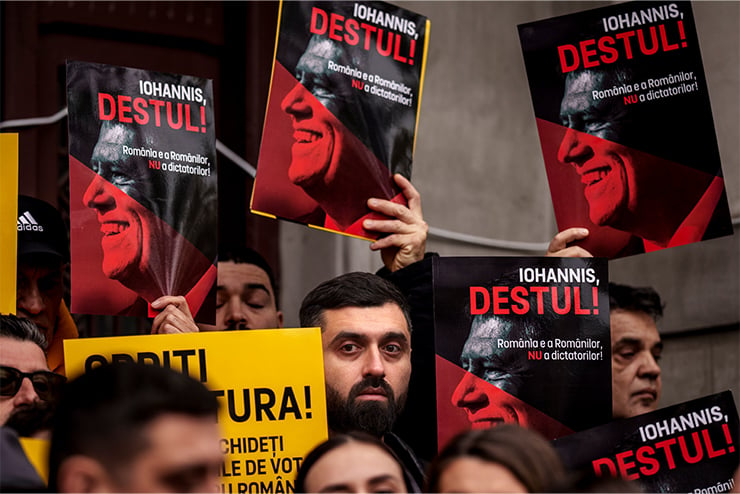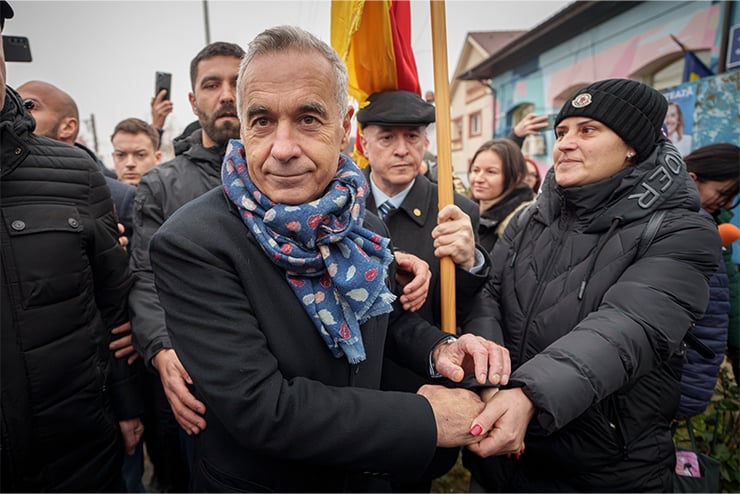Letter from Romania
The global onslaught by the Western political class against freedom and every form of traditional values has claimed its first kill among the European democracies. The most brazen intervention yet is the annulment of election results and indefinite suspension of elections in Romania by its Constitutional Court—all in the name of “protecting democracy.”
The presidential candidate who won the first round in late November—Călin Georgescu, a conservative Christian and opponent of the war in Ukraine—was unacceptable not only to the Westernized elite of this strategic NATO-member country but above all to the Biden administration and European Union. So, subtlety was laid aside and the country’s top court simply quashed the result as soon as the thinnest pretext could be devised.
The Constitutional Court’s action was announced shortly after the Biden administration openly threatened Romania with the specter of curtailing security cooperation, foreign investment, and (for Romanians) the critical issue of easing of travel restrictions for entering the United States.
No one believes the official rationalization—not even those mouthing it—that alleges a massive Russian “attack” on the Romania electoral system. The resemblance of this narrative to Hillary Clinton’s Russian collusion hoax in the 2016 American presidential election is uncanny and shameless. Other than vague insinuations from Romania’s security agencies, no evidence has been presented that any such interference took place, that Russia was behind it, that significant numbers of votes were affected, or that it made any difference to the election outcome. No one alleges electoral fraud or denies that Georgescu’s votes were genuine, nor that he was certain to win the second round. Yet those votes now go into the bin and Romanians, along with all Europeans, are being told they will vote correctly or they will not vote at all.
If Romania’s electoral system is so vulnerable to “Russian attack” (a weakness that also has not been proven), then the obvious solution is to repair the electoral system, not to hand an unelected judiciary the power to control the other branches of government, effectively ensuring that they are unelected as well.
All of this is a transparent power play by Western elites, because they went into a panic following Georgescu’s first-round victory. Though he was hardly mentioned in news broadcasts or opinion polls before the election, Georgescu won with 23 percent of the vote. The candidate favored by the media and pollsters, Prime Minister Marcel Ciolacu, came in third with 19 percent rather than the 26 percent predicted by the mainstream polls. In the second round, Georgescu was due to compete with another media favorite, Elena Lasconi, variously described as a “liberal” and “center-right” (though ideological identification is not strong in Romania) and an “ardent backer of Romania’s membership in NATO and the EU as well as a vocal supporter of Ukraine.” With two such clearly differentiated candidates, the second round was set to be a referendum on the war in Ukraine.
Even Lasconi, who fully accepts the demonization of the “far right” and of Georgescu, initially responded honestly to the court’s annulment of the vote.
“The Romanian state trampled on democracy,” she said. “God, the Romanian people, truth, and the law will prevail and punish those who are guilty of destroying our democracy. You are leading the country into anarchy.”
Still, she fell into line when her party discussed replacing her as its candidate.
Like most of East-Central Europe, Romania is a traditionalist and Christian country, proud of its history and folk culture, where even young people with iPhones may be only a generation or two removed from their peasant past. Its population shares the values of other sovereigntist cultures in Hungary, Slovakia, and Serbia, whose governments closely reflect their citizens’ preferences. Globalist initiatives and Western “woke” ideology hold almost zero appeal here, save for a tiny Westernized elite in the government, judiciary, media (including polling firms), nongovernmental organizations, and universities. Along with Bulgarians, Romanians are the Europeans least supportive of the war in Ukraine. They also have Europe’s lowest COVID vaccination compliance rate.
Until now, Romanians have not been outspoken politically about their dissent from Western ideological narratives. Many seem resigned to “Švejk syndrome” that still afflicts much of the region: the tendency, named after Jaroslav Hašek’s novel, The Good Soldier Švejk, of small weak nations with powerful neighbors to refrain from overtly defying authority, however tyrannical or inane, and choosing instead to keep their heads down while quietly finding passive ways to evade and resist.

outside a closed voting station in Bucharest, Romania, Sunday, Dec. 8, 2024.
(Vadim Ghirda / Associated Press)
The party usually held to represent Romania’s “far right,” the Alliance for the Union of Romanians (AUR), burst suddenly onto the political scene in 2020 with impressive electoral results, owing to its dissent over the COVID lockdown and vaccines, but it then squandered its newfound popularity by its diffidence in opposing the Ukraine war. One party official told me early on that AUR feared being identified as “pro-Russian.” AUR’s timidity makes clear that the 2024 election was foremost about the Ukraine war, since otherwise voters could have voted for AUR candidate George Simion.
AUR had deprived Georgescu of his role in the party when he became too outspoken about the war. He calls for ending aid to Ukraine’s government and expresses doubts about NATO’s reliability to defend its member states. He said that the election result shows that Romanians had “cried out for peace.”
Even AUR was caught off-guard by Georgescu’s success. Led by Simion, AUR espouses a peculiar nationalism that advocates reunification with the Romanian-speaking (but partially Russified) Republic of Moldova, a pointless agenda that neither country wants and serious people understand is both unlikely and undesirable. AUR had also distanced itself from the political heterodoxy of Hungarian Prime Minister Viktor Orbán, reflecting long-standing friction over the Hungarian minority in Transylvania. Georgescu, by contrast, expresses admiration for Orbán and says nothing about re-establishing the “greater Romania” of the interwar years. AUR now supports Georgescu’s candidacy and vocally criticizes the cancelation of the election results.
This lack of previous enfranchisement explains how the soft-spoken but forthright Georgescu was able to build a following so quickly among traditionalists. Some see this and the skillful use of TikTok by his followers as evidence of Russian “meddling,” though again, nothing is proven. Contrary to media narratives, Georgescu did not “emerge from nowhere.” He was quite deliberately ignored by the media and polling firms. As recently as October, pollster Inscop listed him under “other” with support of less than 0.4 percent. Earlier in November, it ranked him in sixth place with 5.4 percent of the vote.
In addition to dissent on Ukraine and COVID, his expressed concern for preserving the Romanian land and its agrarian culture is consistent with ingrained Romanian values and harkens back to the peasant parties that flourished throughout interwar Eastern Europe (for Romania, its Golden Age), before being crushed by Communists and Fascists. Yet Georgescu, a former United Nations official, expresses his agrarian populism in a peculiar New Age rhetoric that blends an eclectic assortment of views. Whatever his peculiarities, his “extreme right” nationalism contains not a hint of xenophobia, belligerence, racism, or authoritarianism.
Romania’s low international profile until now is reinforced by incumbent President Klaus Iohannis, an obedient servant of NATO and the European Union who reliably supports the Ukrainian government according to the instructions he’s given from Washington and Brussels but who also avoids taking a public stance on the war or much of anything else. Epitomizing today’s European politicians-on-the-make, who disdain their own people as they chase sinecures in Brussels, he demeaned himself in the eyes of many Romanians earlier this year by openly—and unsuccessfully—angling for the post of NATO Secretary General. In the 2024 election, the candidate from Iohannis’ National Liberal Party (PNL) scored below 9 percent of the vote.
Iohannis fully supports the election cancelation, unsurprisingly, because it allows him to remain in power indefinitely past his mandate—just like his counterpart in neighboring Ukraine, Volodymyr Zelensky. Some jurists are contesting his constitutional authority to do this—and the court’s—but its action cannot be appealed.
Equally striking is that Georgescu polled an impressive 43 percent among Romania’s important diaspora. The “mainstream” candidates competed fiercely for the diaspora vote because it is large, young, affluent, educated, and politically aware. They mistakenly assumed that it is also left-liberal. Young Romanians emigrate under economic pressure, but many remain patriotic and would prefer to return and help rebuild their homeland, which has enormous untapped potential in natural and human resources. This hope is frustrated by the corruption over which the ruling Socialists (PSD) and PNL preside.
The last time the diaspora mobilized politically was a few years ago when Norway’s hyper-feminist child-protection gendarmerie seized the children of a Romanian couple for the “abuse” of raising them as Christians. All five children were put up for adoption in separate homes. Romanians abroad amassed such determined protests at Norwegian embassies around the world that they succeeded in getting all the children returned to their parents.
Significantly, Romania does not really have a left. The PSD, which succeeded the previous regime’s Communist Party and has dominated Romanian politics since that regime collapsed, is socially moderate and even conservative, showing little interest in “woke” or “LGBTQ+” ideology. They remain the party of older traditionalists in some regions, though it was at their expense that AUR emerged. Like Iohannis, the PSD/PNL duopoly supports canceling Romanians’ votes, giving themselves a second chance to fight the election they lost the first time. In an obvious conflict of interest, they even get to decide when (perhaps even if) that election takes place, which (as British prime ministers know) confers a huge advantage.
The Constitutional Court may further place its fingers on the scale by barring Georgescu from running again. Prior to the election, it had already barred another “far right” candidate, Diana Iovanovici-Șoșoacă, on a different but equally implausible pretext that provoked outrage well beyond her followers. Predictably, a criminal lawfare investigation has been opened against Georgescu, following the playbook of American, French, and other corrupt leftist prosecutors. Police have raided the homes of his supporters.
The European Union—ostensibly promoting “the rule of law” when it pressures Poland and Hungary to conform their immigration practices (over which the EU has no jurisdiction)—has been utterly silent on overturned election results and police-state methods, except to presume the truth of the Russian collusion “suspicions.” Those who allege that “the rule of law” really means the rule of lawyers feel vindicated that democracy can be suspended by judicial fiat with the acquiescence of an EU that supposedly promotes “human rights.”
So far, no mass protests have appeared against the cancelation, though a petition said to number a million signatures was quickly circulated.
Georgescu’s appearance on the political scene comes as tensions between Russia and the West reach unprecedented levels, surpassing even the Cold War.
Under the feckless Iohannis and the timid AUR, Romania has been conspicuously ignored in debates about a war so close that drone debris regularly falls on Romanian soil, and Russia has declared that NATO bases supplying the war from Romania are fair game for Russian attack. Yet, if nothing else, Georgescu has given Romanians a voice. Romanian territory is key to supplying Ukraine, and Romania’s president has significant powers in foreign and security policy. Georgescu’s election and diminished Romanian support for the war would further strain the Biden administration’s effort to prolong it (and even escalate it) past Trump’s inauguration and lock his administration into open-ended military commitments.
Other than Ukraine itself, Romania is the first European country where Western powers intent on fomenting and perpetuating war and enforcing ideological orthodoxy are not content with a bit of censorship but show themselves willing to extinguish democracy itself.

Leave a Reply